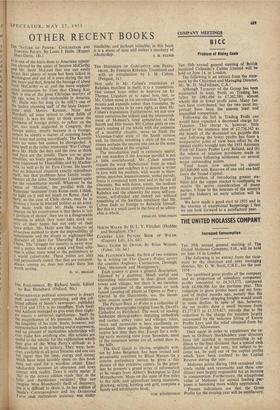THE HISTORIES OF GAROANTUA AND PANTA- GRUEL. By Francois Rabelais.
Translated and with an introduction by J. M. Cohen. (Penguin, 5s.) NOT only is Mr. Cohen's translation of Rabelais excellent in itself, it is a translation. One cannot hope either to improve on Sir Thomas Urquhart or to equal him, but, as Mr. Cohen notes in his introduction, Urquhart recasts and expands rather than translates. So his version exists in its own right, as does Mr. Cohen's translation. Furthermore, we can now spare ourselves the tedium and the impoverish- ment of Motteux's tired completion. of • the fourth and fifth books. Mr. Cohen gives us one man's reading of the whole with the omission of a doubtful chapter, saves• us from the Victorian-Tudor style of the Smith version and, by literally inventing a style of his own. comes perhaps the nearest one can to the sense and the richness of the original.
The introduction itself is extremely useful, yet one wonders if the Joycean parallel is not little overlaboured. Mr. Cohen sensibly rescues the word 'Rabelaisian' from its usual connotation and redefines it to denote a writer in love with his medium, with words in them- selves, speeches, loquaciousness, verbal parody. Joyce is compared both here and in the use of obscenity, But with Joyce, surely, the medium becomes a far more cerebral concern than with Rabelais and the obscenity far more self-con- scious, self-divided and indeed not without something of the Swiftian repulsion that Mr. Cohen finds so foreign to Rabelais himself. But this is a small cavil in the face of so admir- able a whole,
CHARLES TOMLINSON


































 Previous page
Previous page